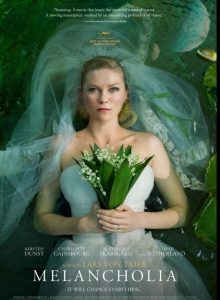
No cataclysm could equal the impending destruction of our planet; a collision with another massive body would end all life in nearly an instant. As the sphere approaches, it would surpass the moon in apparent size, accelerating at it grew closer and filled the entire sky before merging with Earth and transforming the crust into fiery mantle. Arthur C. Clarke commented that regarding the possibility of life elsewhere in the universe, there either is or isn’t – both are frightening possibilities. Lars Von Trier’s Melancholia boldly considers themes across many spectra in this story of a massive exoplanet named Melancholia that is approaching Earth and threatens to pass very close to its orbit. This is about as existential as a narrative can become, as everyone on this planet gets a clear view of what may destroy them – or not – and nothing can be done about either eventuality. The future and the past become one before the arrow of time threatens to leave us off the track forever. Trier digs deeper and compares human reactions to tragedy, as well as how such people respond with depression versus rationality. This is an exceedingly thoughtful work and bears rewatching, as this is Trier at, oddly enough, his most playful.
The first act is a wedding, as Justine is married to an enthusiastic suitor; the second act considers Justine (Kirsten Dunst), Claire (Charlotte Gainsbourg), and John (Kiefer Sutherland) as they watch the exoplanet approach. The first appears wholly irrelevant other than character development, but similar to The Deer Hunter, it is essential for establishing themes about ritual. In Melancholia, the rituals of marriage are helpful for setting expectations and adhering to society norms. The bride is expected to be happy, the family supportive, a lot of money is expected to be blown, and everyone settles into the rut created on that road so often travelled. Compared to the apocalypse, it is all painfully tedious and trivial, but with Trier’s steady hand on the rudder, it becomes a fascinating disaster.
At the root, Justine has depression, and ultimately is unable to fake being happy even though she is surrounded by people who want her to be so. Her self-loathing and self destructive nature turn a night of gifts into an empty rejection. She cannot adjust, and the inherent imbalance caused by depression compels her to wander, and brood, and ultimately become lost. The rest of the party is made up of colliding molecules that are destined to continue smashing one another until dispersed. Justine’s mother is so happy with her cynical unhappiness she states that weddings are pointless divorces in progress. Charlotte Rampling sells this as less of a howl of pain as much as an observation borne by years of experience. Claire (Justine’s sister) numbly watches the evening go to shit, while John (Claire’s husband) grouses about how much this farce is costing him. Claire has anxiety problems, while John is a cold and calculating rationalist, but they deal with this crap well enough. This is a discouraging foray into the unimportant things people magnify into upheaval before true disaster arrives. Even so, at a ritual meant to mark the beginning of two lives together, there is a dearth of hope, love, and true passion.
With the stage so set, what happens to our smaller community of Justine, Claire, and John when the rug is truly pulled out? If a collision is to occur, then hope is utterly lost. What does a deeply depressed person, a moderate, and a measured rationalist do as fate decides whether they draw breath? In this laboratory of extreme circumstances, perhaps someone slightly off can contemplate what may be final days with less anxiety; perhaps suicidal ideation becomes the reasonable approach. At the same time, if science is not enough to feed the rational mind, would those people fall to pieces? When we are no longer protected by ritual, the outcome can be difficult to foresee. For the deeply depressed, there comes a profound peace with completely giving up hope. Melancholia encourages us to embrace futility and coming to terms with oblivion. I am not sure I agree with Trier’s conclusions, but that is not the point – what is important is considering such things in the first place. It is often noted in psychiatry that there is no ‘normal’, and that is made clearer under extraordinary circumstances.
Melancholia is beautifully shot, and manages to engross the viewer with a determined and ambitious meditation on humanity that has lost touch with hope. By violently shifting from a first act mired in triviality to a potentially apocalyptic vision, the perspective of the viewer is shifted in the most radical way possible. During a party noted for excess, happiness is impossible; as this family considers what may be the end of the world, happiness is impossible. Absurd, but part and parcel of the human condition. When all that complicates life is removed, interestingly, Justine and Claire become about as close to happy as either is likely to experience – a resigned acceptance. Justine’s depression is inconsistent, fitful, and nonspecific to the point of banality. Perhaps, but every character drowns in their own banality, coping with their own unique skill set. The planet Melancholia as an object and plot device is a way to profoundly move the goal posts, but it also is a massive metaphor for the melancholy that swallows the whole of the human experience. We seem incapable of true happiness or accomplishment in our myopic vanities, stunted emotions, and crippled psychology. We each deal as best we can, but ultimately the fight with our limitations is a losing one. You will draw your own conclusions as to whether this has any merit, but this is Lars Von Trier’s vision, a colorful melancholy of frozen images set to Wagner’s Tristan und Isolde. It coalesces into a haunting work, universal enough to make any viewer’s experience wholly unique.